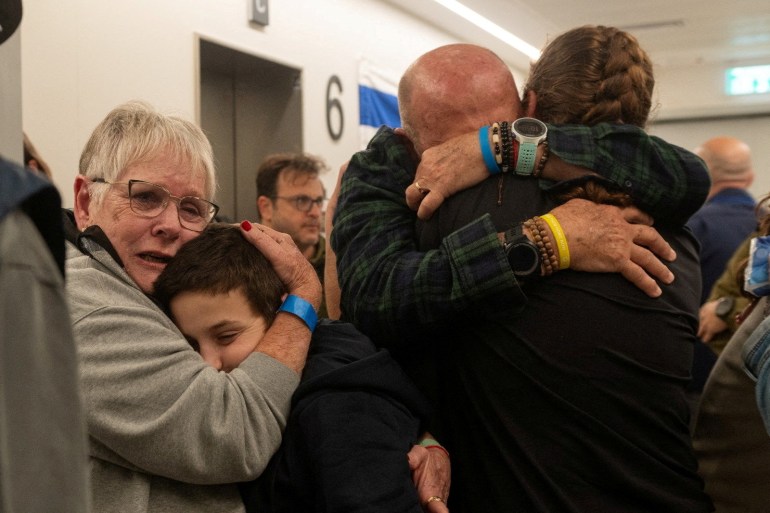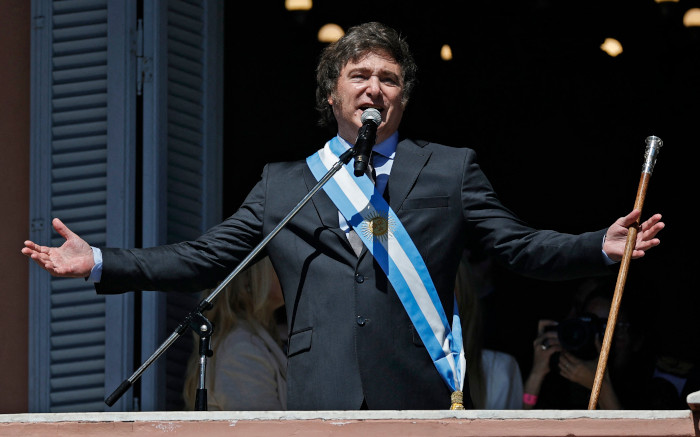
Israeli women and children returning from captivity in the Gaza Strip have spoken of being beaten and threatened, moved from place to place and forced to whisper while left with little to do for weeks, their families say.
Most of the prisoners released during a six-day ceasefire have been taken to hospitals in a country still reeling from the shock of their abduction during a Hamas attack on southern Israel on October 7 that killed 1,200 people, according to Israel were killed.
Since the The latest round of releases began on FridaySince Israel releases some imprisoned Palestinians in return, the released prisoners have been kept away from the media.
Their stories have come to light through the filter of family members without independent verification and offer a clue to their suffering. Most of the 240 prisoners Israel said were arrested on October 7 are still in captivity.
Deborah Cohen told French broadcaster BFM TV that she was told that her 12-year-old nephew Eitan Yahalomi and others were beaten by Palestinian residents when they arrived in Gaza during the Hamas attack. She said his captors forced him to watch footage of Hamas violence.
“Every time a child cried there, they threatened them with a gun to silence them. When they arrived in Gaza, all the civilians beat them… We’re talking about a child, 12 years old,” she said.
Hamas, the Palestinian armed group that rules Gaza, says it treated the prisoners in accordance with Islamic teachings to protect their lives and well-being.
It is said that some prisoners were killed by Israeli airstrikes during a military offensive launched in response to the October 7 attacks. According to Palestinian officials in Gaza, the Israeli air and ground attack killed more than 15,000 people, including more than 6,000 children.
Speak in a whisper
Little by little, some details come to light from treating doctors and relatives of the freed prisoners.
Ronit Zaidenstein, head of the medical team at Shamir Medical Center, where 17 released Thai nationals were treated, said they were fed “very low-nutrient food” in captivity.
“The people who came to us lost a significant amount of their body weight in such a short period of time – 10 percent or more.”
In an interview that has since been taken offline, Margarita Mashavi, a doctor at Wolfson Medical Center – one of the main facilities caring for released prisoners – said those she spoke with described being several floors under the Earth were held.
“They didn’t give them light. They only gave it to them for two hours,” she was quoted as saying by news site Ynet on Monday.
The families of two girls who were kept together found it difficult to hear their children when they returned home because they only spoke in whispers.
“I had to put my ear close to her mouth to hear. In captivity she was told not to make noise. You can see the terror in their eyes,” Thomas Hand, the father of nine-year-old Emily Hand, told CNN.
Yair Rotem said his niece, Hila Rotem Shoshani, 13, was held with Emily Hand and was now also speaking in a whisper. She spoke of hugging her mother, Raaya, who was still in Gaza and crying when the girls were taken away from her before her return to Israel.
Merav Mor Raviv said that the kidnappers of her cousin Keren Munder, Keren’s nine-year-old son Ohad and her mother Ruth spoke Hebrew and sometimes moved a finger across their throats, as if to warn of death if they did not do as they were told was said.
She told Israel’s Channel 12 that they were moved from place to place, both underground and above ground. They lost weight as food was scarce at times and ate mostly rice and bread.

Thoughts about reunification
Adva Adar said her grandmother Yaffa Adar, 85, showed toughness by constantly thinking about reuniting with the family.
“She said that she thought a lot about the family and that it helped her survive and that she could hear the voices of the great-grandchildren calling her and that it gave her a lot of strength,” the granddaughter told Reuters.
An Israeli mother, Daniel Aloni, wrote a letter with daughter Emilia to thank Hamas’ armed Qassam brigades before her release. Her story went viral in the Arab media.
Daniel wrote them a letter to thank them for giving Emilia sweets and fruit and treating their daughter like a queen.
“I will forever be grateful that she doesn’t leave here traumatized,” she wrote. “If only we could be really good friends in this world.”






Recent Comments